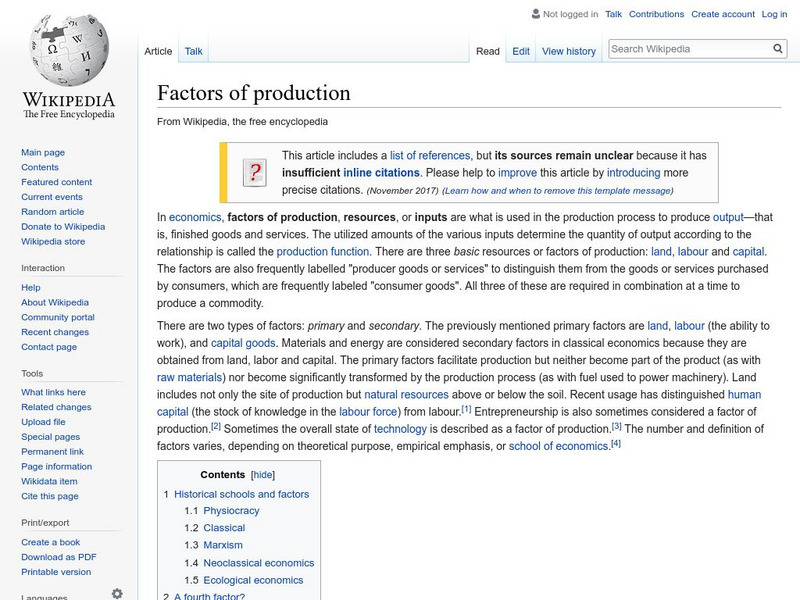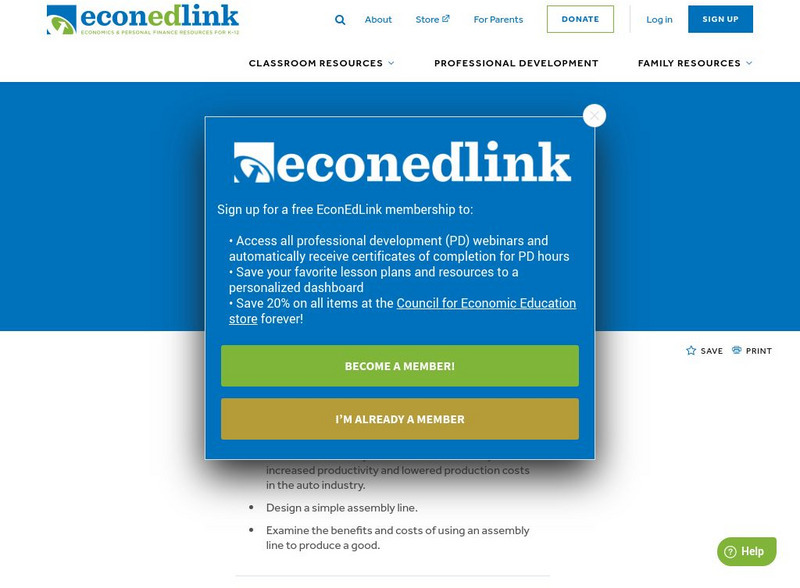Hi, what do you want to do?
Curated OER
I'm in Business, Now What Do I Charge?
Students determine what price must be charged in order for an entrepreneur to breakeven and to make a profit. They calculate the breakeven price, identify opportunity costs, and write a paragraph explaining what costs should be used for...
Curated OER
Breaking News English: Coca Cola
In this Coca Cola worksheet, students read the article, answer true and false questions, complete synonym matching, complete phrase matching, complete a gap fill, answer short answer questions, answer discussion questions, write, and...
Curated OER
Looking at Food Labels
Students interpret the food and nutrition on food labels. They determine their nutrient needs and how comprehending food labels can help them to meet those needs. Pupils recall that food labels provide nutrition information to help...
Curated OER
"The Nation's Playground": Technology and Tourism
Students examine Maine tourism websites. They identify ways the Internet has changed the tourism industry in Maine.
Curated OER
Buying Power
Students use a magazine article/picture to explain consumer spending and discuss the key elements that influence consumer spending.
Curated OER
Hawaii's Future Tied to History
Students investigate Hawaii's history to help them explain how a Reorganization Act may affect its residents. students track the region's history from statehood, to kingdom, to human settlement.
Curated OER
Hometown Heroes
Students interview various entrepreneurs in their town, asking what they considered in starting and then operating their business. They compose a short essay to report their findings.
Curated OER
Doctor's Dilemma: Advocacy for Whom?
Young scholars investigate why doctors feel torn between patients and insurance companies. They examine the health care system and how it affects patients. They discuss one's ability to afford health insurance as well.
Curated OER
LEGO Mini-Golf
Students work together in teams to build a LEGO golf course. They build holes with sensors on them for the golf balls. They answer questions about their project to end the lesson.
Curated OER
Farming in a Fishbowl: How Ethnic Groups in
Seventh graders research Chinese agricultural needs and practices. They conduct an experiment with aquaculture and germinated rice as they take measurements and apply the scientific method.
Wikimedia
Wikipedia: Factors of Production
This site gives an overview of economic factors of production (land, labor, capital). Gives detailed descriptions, and links to descriptions of words that might need clarification. Students can make connections as to how these relate to...
Council for Economic Education
Econ Ed Link: Music, Maestro, Please: Show Business and the Factors of Production
The city of Philadelphia, Pennsylvania recently opened a $300 million dollar center for the performing arts, the Kimmel Center. This lesson was developed for a special teacher workshop to incorporate economics and the arts to teach kids...
University of Minnesota
University of Minnesota: 2.1 Factors of Production: Principles of Economics
The three factors of production-labor, capital, and natural resources. Explain the role of technology and entrepreneurs in the utilization of the economy's factors. Labor is the human effort that can be applied to the production of goods...
Khan Academy
Khan Academy: Introduction to Scarcity and the Economic Way of Thinking
In this exercise, practice what you have learned about learning objective MOD-1.A from the AP Macroeconomics course and exam description. Topics include the definitions of economics, microeconomics, and macroeconomics, positive and...
Other
Economics in Action: Circular Flow
This site uses an interactive Circular Flow Model to show the flow of payments for the factors of production (rent, wages, and interest) along with payments for finished goods and services. Questions are provided which ask the user if a...
Council for Economic Education
Econ Ed Link: Increasing Productivity
This lesson stimulates learners' thinking with stories about rigorous athlete training illustrating the importance of training and practice. After students read the story, they will experiment to see how instruction and practice improves...
Federal Reserve Bank
Federal Reserve Bank of Atlanta: Circular Flow
Explains how resources, goods and services, and payments flow through the economy using the economic model of circular flow.
Curated OER
Factors of Production
This site offers a good description and examples of the factors of production.
Council for Economic Education
Econ Ed Link: Henry Ford and the Model T: A Case Study in Productivity (Part 2)
Henry Ford's use of mass production strategies to manufacture the Model T revolutionized industrial manufacturing. This 3-part learning unit provides students with the story of Henry Ford and the Model T from an economics perspective....
Council for Economic Education
Econ Ed Link: Henry Ford and the Model T: A Case Study in Productivity (Part 1)
Henry Ford's use of mass production strategies to manufacture the Model T revolutionized industrial manufacturing. This 3-part learning unit provides students with the story of Henry Ford and the Model T from an economics perspective....
Council for Economic Education
Econ Ed Link: The Economics of Professional Sports: Underpaid Millionaires?
Over the last century, professional baseball has grown to become one of the most popular forms of American entertainment. Indeed, the sport's nickname - "America's Pastime" - has become embedded in the nation's lexicon. More than 60...
Council for Economic Education
Econ Ed Link: The Price of Gasoline: What's Behind It?
In this lesson, students investigate the variables that contribute to the cost of gasoline. They learn that while OPEC nations do influence the price of oil and thus the price of gasoline, other factors also influence the price.
Council for Economic Education
Econ Ed Link: The Economics of the Family Farm
Learn about the status of farming as a career, investigate the management of a family farm, and examine one recent farm crisis in this lesson.






















